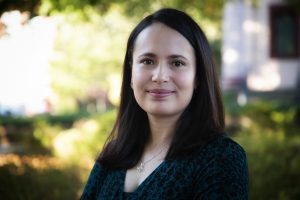Ana María Silva Campo
Assistant Professor of History
Hamilton Hall 509
(919) 962-2115
anasilva@unc.edu
Dr. Ana María Silva Campo is an Assistant Professor in History at the University of North Carolina, Chapel Hill. She is a historian of race, gender, religion, and the law in colonial Latin American cities. Her book manuscript, Travelers of the Half Moon Gate, studies the formation of religious, gendered, and increasingly racialized hierarchies in Cartagena de Indias, the main port for the trade in African captives in Spanish South America during the seventeenth century. It examines the tension between the political economy of the trade in African captives and Spain’s imperial project to enforce religious orthodoxy. Using the rarely studied financial archives of the tribunal of the Inquisition in Cartagena, Travelers of the Half Moon Gate shows how the Inquisition transformed the city by confiscating and reselling the houses of free women of African descent while preserving the networks that sustained the trade in African captives during the seventeenth century. Dr. Silva Campo’s work has appeared in English in the Hispanic American Historical Review, the Colonial Latin American Review, and in Spanish in Varia História. Dr. Silva Campo is also working on two collaborative projects on race and slavery with interdisciplinary teams of researchers. The first one studies the dynamics of enslavement of refugees from the Haitian Revolution in the United States after the ban on the slave trade. The second one compares the histories of South Africans of different racial backgrounds who colonized areas of Patagonia, Argentina, during the twentieth century. As a public scholar, she has curated online and museum exhibits about slavery and its legacies in Colombia and Argentina and written for leading Latin American newspapers, including Argentina’s Clarín. Dr. Silva Campo teaches courses on Latin America under colonial rule, law and society in Latin America, witchcraft and magic in the early modern world, and women and gender in Latin America.


